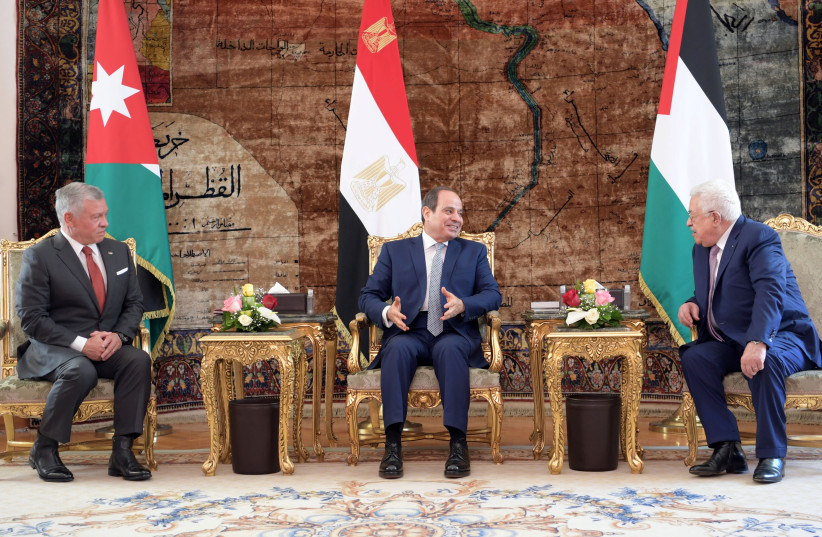The Quartet must replace the United States as the main broker in any peace talks with Israel, Egyptian, Jordanian and Palestinian leaders declared at the end of a trilateral summit in Cairo on Thursday.
They pledged to “work together to develop a vision to activate efforts to resume negotiations, and to work with brothers and partners to revive the peace process,” according to a statement issued at the summit’s end, and that this would be done “in accordance with international resolutions, and under the auspices of the International Quartet,” composed of the United Nations, the European Union, Russia and the United States.
Egyptian President Abdul Fattah el-Sisi hosted King Abdullah of Jordan and Palestinian Authority President Mahmoud Abbas in advance of next month’s opening of the UN General Assembly in New York.
The three leaders want to use that international platform to help revive the Israeli-Palestinian peace process, which has been frozen since 2014.
The US has traditionally brokered that process, but unlike any of his predecessors in the last three decades, US President Joe Biden has not put forward any plan for a resolution to the conflict.
Prime Minister Naftali Bennett has also said that peace talks are not possible at this time, and he has no intention of meeting with Abbas.

Both the US and Israel have spoken of maintaining the status quo until there are optimal conditions for a successful resolution to the conflict.
The PA has warned that talks must take place now, but with a Quartet-led process.
Abbas received support for that view in Cairo when the three leaders “affirmed the centrality of the Palestinian issue and the firm positions of Egypt and Jordan in supporting the Palestinian people and their just and legitimate rights, foremost of which is their right to embody their independent, sovereign state on the borders of June 4, 1967, with East Jerusalem as its capital,” the summit statement explained. This should be done in accordance with UN resolutions and the 2002 Saudi peace initiative.
This was the only way to achieve “regional and international peace and security” the statement explained, and “all efforts must be united to achieve it.”
The summit statement rejected “illegal Israeli measures that undermine the two-state solution,” including “construction and expansion of settlements...land grabs, house demolitions and the displacement of Palestinians from their homes,” specifically “from the neighborhoods of Jerusalem, especially Sheikh Jarrah and Silwan, and to stop all unilateral measures that undermine peace efforts and the two-state solution.”
It stressed preservation of the historical and legal status quo in Jerusalem and its Islamic and Christian sanctuaries such as the Temple Mount, highlighting Jordan’s special ties to the compound as expressed in the “historical Hashemite guardianship over the Islamic and Christian holy places in Jerusalem.” The leaders welcomed Egypt’s efforts to stabilize the situation in Gaza after the 11-day war in May, and to foster reconstruction in the enclave.
They called on the international community to alleviate the humanitarian crisis in the Gaza Strip, and for Israel to recognize Gaza’s humanitarian needs.
Prior to the summit, Abbas met separately with Sisi and briefed him on the latest political developments, the internal Palestinian situation, and general developments in the West Bank and Gaza Strip, Palestinian officials said.
Abbas expressed his appreciation for Egypt’s tireless efforts on behalf of the Palestinian cause, the officials said, and also praised Egypt’s “historical role in this regard...manifested in its active and key role” in ending the Gaza war in May.
Abbas and Sisi agreed to continue consulting and coordinating on the Palestinian situation. Sisi affirmed Cairo’s aim of restoring Palestinians’ legitimate rights.
Sisi, the officials added, expressed support for increasing the PA’s role in the Hamas-ruled Gaza Strip, and said he would push for the resumption of negotiations with Israel.
